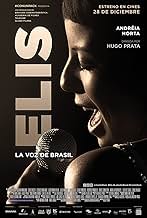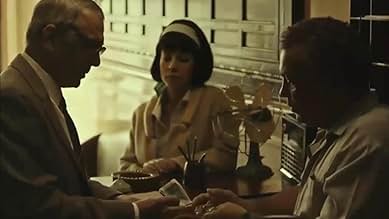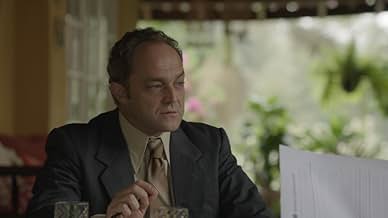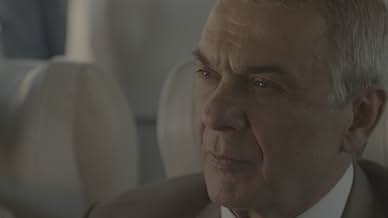AVALIAÇÃO DA IMDb
6,7/10
2,2 mil
SUA AVALIAÇÃO
Segue a vida de Elis Regina, indiscutivelmente uma das maiores cantoras brasileiras de todos os tempos.Segue a vida de Elis Regina, indiscutivelmente uma das maiores cantoras brasileiras de todos os tempos.Segue a vida de Elis Regina, indiscutivelmente uma das maiores cantoras brasileiras de todos os tempos.
- Direção
- Roteiristas
- Artistas
- Prêmios
- 19 vitórias e 14 indicações no total
Júlio Andrade
- Lennie Dale
- (as Julio Andrade)
- Direção
- Roteiristas
- Elenco e equipe completos
- Produção, bilheteria e muito mais no IMDbPro
Avaliações em destaque
When Elis passed away in 1982, people and talked about an involuntary, casual overdose: she was kinda "first-time sailor," the media never spoke of suicide. The writers of this film, however, reveal that she had been using drugs since long before (the mid sixties to be precise) and did commit suicide, driven by a chronic, deep depression. The movie was based rather on the musical show "Elis, a musical" by his fan, producer, friend and lover Nelson Motta than on Julio Maria's biography entitled "Nothing will be as before." The complexity of Elis's life was directly proportional to her unpredictable, impetuous, and ambitious personality. Only five feet tall, Elis was blessed with a high-pitched, sincere voice, good technique, and a great rhythmic and harmonic sense, somewhat jazzing everything up. The film omits her first two records produced under the tutelage of the father, with a repertoire chosen by the recording label and a standard background playback sound. It also omits her first source of income when she arrived in Rio de Janeiro in 1964, namely the jingles she recorded for advertising agencies under the tutelage of her first boyfriend in Rio, Henrique Meyer, also a gaucho. The film exaggerates, on the other hand, the supposed political side of the singer - who was never a communist. It highlights characters absolutely unimportant for this kind of biopic, such as one grotesque colonel interrogator of the Brazilian army, one French reporter too preoccupied with the evils of third-world dictatorships, and one particular cartoonist, Henfil from O Pasquim, who slashed her by drawing her singing in the presence of Adolf Hitler. The film, which can be seen as a pleasant musical, involuntarily confirms Heitor de Paola's thesis of drugs acting as a means - whether or not unconscious - of a collective suicidal drive.
I was blessed to have seen Elis Regina upon the stage. This movie tells you a lot of what you need to know about our star's career from the start. Elis's pains and steadfast desire to be free at a sad time when freedom was half enjoyed by a few, and not at all by real Brazilians find a way to lend a voice to those muffled by a cynical and ruthless regime that should stay buried forever, and never be allowed to see the light again. But none of that matters more than the soundtrack. Oh, those songs! It's Elis. Queen Elis. Elis Regina!
This biographical film explores the professional and personal life of the singer Elis Regina. It offers a trip into the atmosphere of the Bresil of the sixties and the seventies. A real effort of reconstitution of the choreography, cloth, furniture, etc. has been made. The actress performs very well in different areas. Time passes quickly as it has several rebounds.
I've had a passing fascination for Elis Regina for many years and was very surprised to see this film advertised on Amazon Prime Video as I had not heard anything about it. I immediately assumed it was a documentary because of its lack of promotion in Europe, so you could imagine my surprise when I started playing it and saw a list of actors in the opening credits.
I think the reason why this movie did not resonate too well outside of Brazil is because it was not written for a global audience. The film made too many assumptions: firstly, that you are familiar with Elis' recordings and secondly you were bought up knowing a lot about the Brazilian music industry. Perhaps even more vitally, it made the assumption that everybody is aware of the brutality that occurred during the dictatorship. This, I believe, made the film inaccessible to the world.
Andréia Horta, in my humble opinion, gave an absolutely stunning performance capturing a lot of the essence of Elis Regina that I had seen in her performances and her interviews but, something was badly paced in the actual storytelling. The film either needed to be (at least) another 30 minutes longer or it needed to spread the story more evenly over the course of her years under the spotlight. Up until her television performances, I feel the director got the story right. After that, it was like a needle skating across a record. First a child and then three as if by magic.
This wasn't the main problem for me, though. Again, the movie made the assumption that the audience would immediately know in which year the events were occurring. I found it difficult to know whether the story was still in the mid seventies or the early 80s.
I also have a feeling that the story of her involvement with drugs wasn't properly told. One minute she was trying peyote and the next, we are to suspect that she died of some sort of drug overdose despite saying that music and her children were the most important things in her life.
I could watch this movie again just to enjoy Adréia Horta's performance once more (the support cast were also wonderfully portrayed), but I will end up with the same sense of unfulfillment.
I don't think you needed to be a Ray Charles fan to have enjoyed his biopic and to have felt that you got to know him not only as a singer but as a person as well, but this movie left me with more questions than answers.
I think the reason why this movie did not resonate too well outside of Brazil is because it was not written for a global audience. The film made too many assumptions: firstly, that you are familiar with Elis' recordings and secondly you were bought up knowing a lot about the Brazilian music industry. Perhaps even more vitally, it made the assumption that everybody is aware of the brutality that occurred during the dictatorship. This, I believe, made the film inaccessible to the world.
Andréia Horta, in my humble opinion, gave an absolutely stunning performance capturing a lot of the essence of Elis Regina that I had seen in her performances and her interviews but, something was badly paced in the actual storytelling. The film either needed to be (at least) another 30 minutes longer or it needed to spread the story more evenly over the course of her years under the spotlight. Up until her television performances, I feel the director got the story right. After that, it was like a needle skating across a record. First a child and then three as if by magic.
This wasn't the main problem for me, though. Again, the movie made the assumption that the audience would immediately know in which year the events were occurring. I found it difficult to know whether the story was still in the mid seventies or the early 80s.
I also have a feeling that the story of her involvement with drugs wasn't properly told. One minute she was trying peyote and the next, we are to suspect that she died of some sort of drug overdose despite saying that music and her children were the most important things in her life.
I could watch this movie again just to enjoy Adréia Horta's performance once more (the support cast were also wonderfully portrayed), but I will end up with the same sense of unfulfillment.
I don't think you needed to be a Ray Charles fan to have enjoyed his biopic and to have felt that you got to know him not only as a singer but as a person as well, but this movie left me with more questions than answers.
It's hard to imagine a better performance in the role of Elis Regina than the one turned in here by Andreia Horta. She even looks like Elis and captures her radiant smile perfectly. The lip-syncing to Elis' great songs is very well done; the physical movements, too. If the movie seems to be a bit short in showing Elis' turbulent life, well, remember that her life was tragically short.
Você sabia?
- CuriosidadesAndréia Horta had singing lessons during 3 months, 8 hours a day, so that her interpretation of Elis could be faithful to reality. In the singing scenes, however, it is Elis' real voice we hear.
- Erros de gravaçãoWhen he met and married Elis, César Camargo Mariano did not wear a beard (as in the film).
- ConexõesEdited into Elis: Viver é Melhor que Sonhar (2019)
Principais escolhas
Faça login para avaliar e ver a lista de recomendações personalizadas
- How long is Elis?Fornecido pela Alexa
Detalhes
Bilheteria
- Faturamento bruto mundial
- US$ 2.295.553
- Tempo de duração
- 1 h 50 min(110 min)
- Proporção
- 2.35 : 1
Contribua para esta página
Sugerir uma alteração ou adicionar conteúdo ausente



























